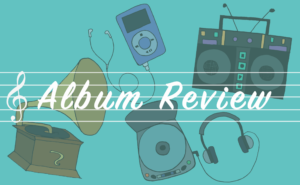“Meet me at midnight.” It’s not a question, but a bold ask. These were the last words of Taylor Swift’s social media posts from Aug. 29 when she announced her 10th studio album, Midnights (2022), which would tell the stories of 13 sleepless nights from her life. What was it that kept the singer-songwriter up late so often she could make a whole album about it? According to her, several things! These include but are not limited to: falling in love, falling apart, revenge, self-loathing, and wondering what might have been. These themes come as no shock to fans of the singer who have heard her time and time again make references to staying up through the night in her music. But on the darkly mysterious Midnights, Swift uses the vulnerability of the late night to reflect on these raw emotions.
With glamorous red carpet appearances, a ’70s-inspired visual aesthetic, a TikTok series gradually unveiling the album’s tracklist, and billboards around the globe showcasing random lyrics, Swift used the two-month wait between the announcement and the release to give all her attention to her first body of new work in two years. The elaborate rollout combined with the album’s rich concept—breaking the boundaries of time by pulling from past and present but only after a specific hour of the night—gave the world something juicy enough to sink its teeth into. And yet, for months, not so much as a snippet was released from Swift’s team. The mystery of Midnights continued right up until the very last second when the clock struck 12 on Oct. 21, and the world tuned in with nothing fueling them but the promise that Swift would meet them halfway.
The album opens with the seductive “Lavender Haze.” A thumping beat pulsates under Swift’s distorted vocals as she echoes her request from the day she revealed the album’s existence to the world—“meet me at midnight.” Except this time it doesn’t feel like a vague phrase so much as a sultry callback, inviting us into this nocturnal world she has kept us in the dark about for months. Laced with spacey R&B-influenced glitches, the track sinks its listeners deep into the hypnotic state one’s mind slips into when the clock moves late enough at night. This exact feeling is what arises in Swift when thinking about the glowing state of love she’s in. “I feel the lavender haze creeping up on me,” she sings in falsetto to describe a relationship that eschews traditional expectations and ignores the “1950s shit” people want from her. With this song, we are put into a dreamy trance, setting a chilled tone for the album.
But don’t let this opener fool you. While some tracks sound like they come from Swift’s sweetest dreams, we quickly find that others pull from her darkest nightmares. The album often bravely grounds itself in introspection, no matter how painful. Songs like “Anti-Hero,” whose fun ’80s-rock vibe is in contrast with its self-critical lyrics, see Swift reflect on her fears and insecurities. Visions of her hypothetical future family murdering her in order to inherit her money reveal the kind of paranoia that induces the singer’s insomnia. The song’s upbeat production combined with the catchy bluntness of the hook (“It’s me. Hi. I’m the problem”) would make it all a little humorous if not so painfully self-aware.
For Swift, perhaps this self-reflection is part of Midnights’ thesis. Each track is sung with a level of wisdom that can only be gained in retrospect. No song shows this better than “You’re On Your Own Kid” whose placement in the album is of great importance as Swift’s fifth tracks are known to be where the emotional crux lies. The song is a coming-of-age anthem addressed to her past self that chronicles a journey from humble beginnings in a bedroom to stardom in big cities. Sung with a subtle country cadence that takes us back to Swift’s Tennessee days early in her career, the track is a sweeping look at the various moments that shape a person. Just like its fifth track, Midnights may draw on various stages of Swift’s life but it uses context gained over time to give perspective. It’s only after enduring 15 years of a career that Swift has the authority to sing to herself, “you’ve got no reason to be afraid.”
This confidence shines through the experimental sensibility of the album, a big genre change that sees her leave behind the indie-folk sound of her 2020 sister albums—and even the country-pop of her 2021 re-recordings—for relaxed synth grooves. The limitless nature of this album’s production creates tailor-made immersive experiences for each song, clearly defining the mood each one holds. It’s one thing to read Swift’s vivid descriptions in “Snow on the Beach” of the moment someone you’re falling for reciprocates the feeling. It’s another to actually press play and hear elegant pizzicato strings under Swift’s voice accompanied by a hushed Lana Del Rey (seems like not even she could escape the background vocals curse). The singers compliment each other softly with every syllable in eloquent phrases like “aurora borealis,” as if saying it any heavier would bring them crashing down from their lightweight Cloud Nine. Sleigh bells are sprinkled through the track, evoking delicate imagery of snowflakes falling. Similarly, “Bejeweled” is a shimmering pick-me-up, mirroring the sudden burst of confidence you get as you’re about to head out late into the sparkling night. Meanwhile, the lo-fi production of “Midnight Rain” is for all the main characters of the world that pensively look out into the black sky through raindrops sliding down their windows.
The standard version of Midnights clocks in at 44 minutes which is rather short for Swift whose last project had a duration of over 2 hours. This short runtime combined with sprawling production and cryptic lyrics creates a slightly unpolished feel that contrasts with some of her other albums of air-tight cohesion. While this adds to Midnights’ charm and embraces the spontaneity of the late hour, it can feel jarring on first listen. What about the people that feel the album experience ends a little too soon (the people in question being me)? Well, if you reach the end of this version and feel something is missing, fear not. In true Swiftian fashion, the singer shocked everyone by dropping seven bonus tracks on streaming services a mere three hours after the album’s midnight release. Why? For the same reason she does most things—she just couldn’t stop writing. In the 3 a.m. post announcing this surprise addition, she explains that “there were other songs [they] wrote on [the] journey” before the perfect 13 fell into place.
Despite these tracks not making the cut, they add a feeling of completeness and form to Midnights, with some of the album’s standouts coming from this last minute late-night addition. What’s more is, as one looks at this full version of Midnights, the all-new genre-bending project begins to feel a bit more familiar, especially to anyone that’s no stranger to Swift’s discography. The bubblegum pop of “Paris” evokes the carefree feeling of Swift’s first pop album, 1989 (2014), as she sings about the City of Love in the same glamorous fashion she would New York City. The way “High Infidelity” melds a technical sound with the woodsy coziness of a guitar places it within the Evermore universe. And the haunting lyrics about the loss of innocence on “Would’ve, Could’ve, Should’ve” act like the aftermath of Speak Now (2012), an album that caught Swift at a moment between adolescence and adulthood. Midnights’ songs are fragments of the thoughts that filled her mind before they were formed into the cohesive albums we know and love today.
If some of this seems a little too far-fetched and thought-out, it’s not. Or, if you won’t take my word for it, take hers. The standard version of the album closes with the 13th track, a synth-pop track with rapid digital arpeggios that feel like they surround you. In this confessional song, she admits to someone—and millions of fans—that the relationship they have did not simply come about by chance, but rather through a carefully crafted series of choices. She is the driving force behind it all, “the wind in our sails, the liquor in our cocktails.” Towing the line between explaining this as a flex, a cheeky joke, and a coping mechanism, Swift shows how a lack of companionship from childhood turned her into a Machiavellian conspirator who leaves no stone unturned in ensuring that each planned detail leads to the right outcome. Yes, it is she that is this song’s titular “Mastermind.”
Some people say to never trust your thoughts past 9 p.m. However, this album proves that maybe the quiet the witching hour brings makes everything appear the clearest, even through the aforementioned “lavender haze.” Swift’s honesty—vague but vulnerable references to her past triumphs and failures—gives her the power to engage with her own lore and the range of emotions it holds. I can safely say I’ll show up to meet her wherever (and whenever) comes next. But, if we believe track 13 to be true, I’m sure she already knew that.
VOICE’S CHOICES: “Would’ve, Could’ve, Should’ve,” “You’re on Your Own Kid,” “Snow On The Beach,” “High Infidelity”





